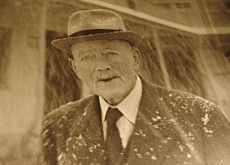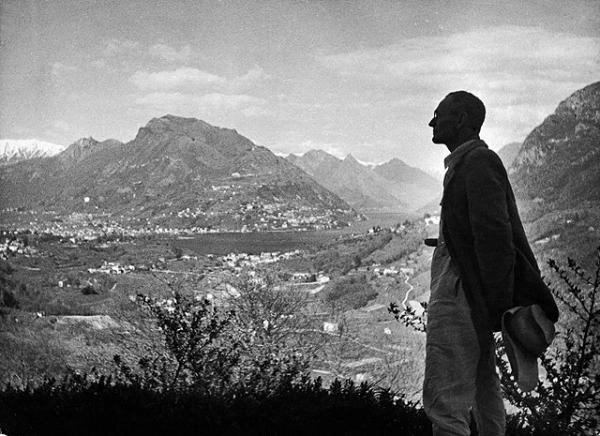Robert Walser finally attracts a loving public

Switzerland has marked the 50th anniversary of the death of Swiss writer, Robert Walser, who enjoyed most of his success posthumously.
At a ceremony in Herisau where Walser died and is buried, finance minister, Hans-Rudolf Merz, who hails from the eastern town, paid tribute to the author.
Robert Walser died aged 78 of a heart attack on Christmas Day, 1956. He had been walking in the snow not far from the asylum where he had been living for 23 years.
In a curious twist, photographs of his body bring to mind images of a dead man in the snow in Walser’s first novel “Geschwister Tanner” (The Tanner Siblings).
Merz, who encountered Walser when he was alive but did not get the chance to speak with him, asked to whom the author now belonged.
The fact that he constantly moved around was proof of his restlessness and lack of roots, and showed that Walser belonged to no one, said the cabinet minister.
Between lines
Swiss writer Jürg Amann, who has written a literary biography of Walser, told swissinfo: “You have to look between the lines with Walser. He hid himself in his writing so that he could be discovered by us in the small detail,”
“It’s really taken the 100th and 125th anniversaries of his birth and the 50th anniversary of his death to make him known at last to the broad public that he deserves.”
Walser’s works have now been translated in many languages and the past year has seen a number of events both in Switzerland and abroad to mark the anniversary.
Amann says one of the reasons Walser was not recognised during his lifetime lay in his character: he retreated from his readers and publishers when a breakthrough was possible.
Not loved enough
Walser, who had eight brothers and sisters, felt his mother did not give him enough love – a factor that was to play a major role in his life.
He describes this feeling in detail in his play “Der Teich” (The Pond). The main character pretends to commit suicide so that he can find out how much he is missed.
“This had an influence until his death. It was only by making himself small and disappear, and through his writing, that he could secure the love of the world,” Amann said.
“He was always a lone individual. He was not really capable of relationships or love.”
In 1905, after failing to become an actor, Walser moved to Berlin where he wrote three novels, in addition to many short stories. There was admiration for his work and authors such as Hermann Hesse and Franz Kafka counted him among their favourites.
High point
The eight years he spent in Berlin were to be the high point of his career and photographs of him there show a self-confident man.
But that all changed in 1913 when he returned to Switzerland. He asked for money from the Swiss Writers’ Association to help him out, but the organisation did not even know him and Walser was forced to start all over again.
For eight years he lived in an attic room of a hotel in Biel. “It was cheap and cold but he managed more or less to survive mentally, although it was difficult because he lost his father and two brothers,” said Amann.
He then moved to the capital, Bern, changing addresses frequently and living a solitary life, although his years in the city were productive.
After suffering a mental breakdown in 1929, Walser was admitted to the Waldau psychiatric clinic, with medical records saying he confessed to “hearing voices”. He was roughly diagnosed as being schizophrenic.
Pencil
He abandoned pen and ink and wrote in pencil, writing in letters that became smaller and smaller, which experts have found hard to decipher.
“I think this was the last step of disappearing. Before giving up [writing] completely, he began to write so that only he could read it,” Amann said.
“First people thought it was a secret language but that turned out to be wrong. It was simply that his writing got smaller and smaller.”
Walser gave up writing completely when he left the Waldau clinic for a similar home in Herisau, where his father was from.
In the 23 years he spent there until his death, Walser shunned company and loved long and lonely walks, particularly in snow. In the end, his death in the snow was perhaps rather symbolic.
swissinfo, Robert Brookes
The Swiss writer was born in Biel on April 15, 1878.
He was an enthusiastic theatregoer and his favourite play was “Die Räuber” (The Robbers) by Friedrich Schiller.
In 1898 a series of his poems was published in the Bund newspaper of Bern.
His spell in Berlin produced three novels and many short stories.
His work has a strong feeling of melancholy, with much of it based on family relationships.
Walser returned to Switzerland in 1913, spending a short time with his sister Lisa in a mental home in Bellelay, where she worked as a teacher.
For eight years, Walser lived in an attic room at the Blaues Kreuz hotel in Biel.
At the beginning of 1921, he moved to Bern, where he worked for a time at the public records office.
In 1929, he moved into the Waldau mental home in the city before spending the last 23 years at a similar home in Herisau in eastern Switzerland

In compliance with the JTI standards
More: SWI swissinfo.ch certified by the Journalism Trust Initiative









You can find an overview of ongoing debates with our journalists here . Please join us!
If you want to start a conversation about a topic raised in this article or want to report factual errors, email us at english@swissinfo.ch.